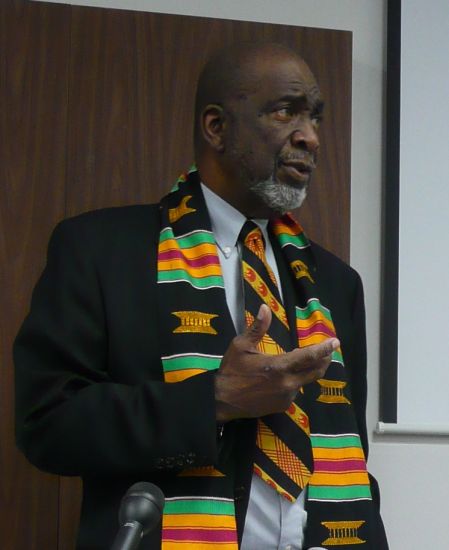
Halifax Media Coop
We are tremendously saddened by the news of Burnley “Rocky” Jones’ death. Rocky was a tireless fighter for the achievement of a better, fairer world and his passing marks a great loss to this city and province. While a friend to many of our members, Rocky was also an inspiration to all of us. Indeed, much of the work done at Solidarity Halifax owes a great debt to his astute political and social analysis of the intersections of race and capitalism developed over a lifetime of fighting for justice, and to the examples of success he has set along the way. He will be greatly missed.
To remember him, here are links toward recorded lectures and interviews:
Rocky Jones remembered as champion of Nova Scotia’s black community
Three CTV reports following Rocky’s death, 2013
Rocky Jones speaks about Ujamaa, as well as the current and future state of the Black community in Nova Scotia
From the Ujamaa Dialogue Lounge AGM, June 13, 2013
Racism, Privilege and Power: Rocky Jones on Nova Scotia’s Black history, and present day struggles
Halifax Media Coop, February 13, 2013
Breaking Down Social Barriers
TEDx StJohns Lecture, 2012
Encounter on Urban Environment
This documentary takes a look at how the Halifax/Dartmouth community was stimulated by a week-long session held by a panel of specialists from different fields who met with members of this urban community. Find Rocky addressing the panel at 68:45 mins.
NFB, 1971
Encounter at Kwacha House
This short film presents a lively discussion between black and white youths at the interracial club in Halifax, touching on racial discrimination in employment, housing, education and interpersonal relations.
NFB, 1967
Africville in 1966
CTV W5 Flashback report featuring Rocky Jones.
Encounter at Kwacha House – Halifax by Rex Tasker, National Film Board of Canada
George Elliott Clarke pays tribute to Burnley Rocky Jones
[He] was the greatest of us. He gave and
he gave and he gave. He said, “Take.” And we did
and we did and did. Again and again and again.
He was everything: Father, friend, teacher, leader.
We didn’t always follow. Sometimes we doubted, But
Rocky never doubted us.
The only good thing about death is that it clarifies.
We can now look back and see clearly–clearly: There
was no one who did more to advance all black people
in Canada–at great personal cost–than did Rocky.
There’s a Chair in Black Studies at Dalhousie; there’s
a TYP at Dalhousie and at the University of Toronto; there
are Black and Mi’kmaq professionals–graduates of TYP–all
over Canada; there’s a Human Rights Commission of Nova
Scotia; there are Supreme Court judgments (tacitly in our
favour); and there are dozens, if not hundreds of semi-students,
like me, all over the planet: All of us owe our existence
to Rocky’s example and his many struggles–plural.
He was imperfect, yes. But his imperfections were part of
his charm, his charisma, his joie de vivre. He danced, he
joked. He was always partly a country boy who fished and
hunted. He loved life–and those who do so are not always
constrained by others’ petty sensibilities.
I can’t be eloquent right now. I just remember the man
who was always there–always ‘right on’–always ‘down’ for
the cause, so long as it was ‘righteous,’ and whose analysis
of race–in its socio-economic and political ramifications–
was always compelling. He was a people’s intellectual who
trained insurgent, people’s intellectuals.
He gave his life to make ours better. It is an epic
sacrifice, and his passing calls us to recognize the
necessity for analysis—-to figure out a way forward through
the perpetual chaos of the moment.
The passing of Dr. Burnley ‘Rocky’ Jones is a reveille for
would-be black radicals to continue his work–of speaking
truth to power and calling for the overthrow of iniquitous power….
As a child of the African United Baptist Association of
Nova Scotia, I ask God to bless Rocky’s soul. May we survivors
seek to live up to his spirited example.

 By Solidarity Halifax members Judy and Larry Haiven.
By Solidarity Halifax members Judy and Larry Haiven.